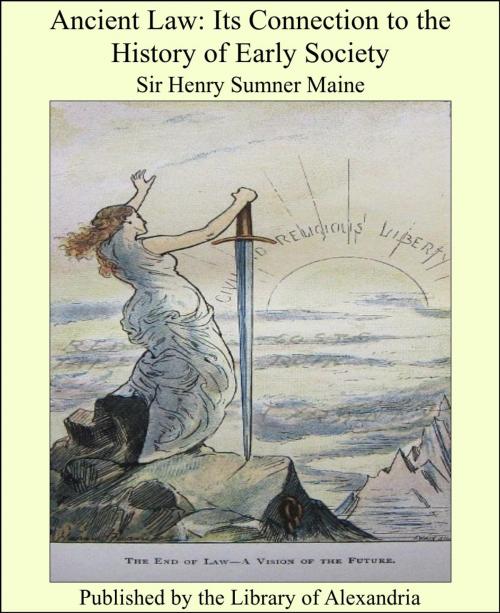Ancient Law: Its Connection to the History of Early Society
Nonfiction, Religion & Spirituality, New Age, History, Fiction & Literature| Author: | Sir Henry Sumner Maine | ISBN: | 9781465538055 |
| Publisher: | Library of Alexandria | Publication: | March 8, 2015 |
| Imprint: | Language: | English |
| Author: | Sir Henry Sumner Maine |
| ISBN: | 9781465538055 |
| Publisher: | Library of Alexandria |
| Publication: | March 8, 2015 |
| Imprint: | |
| Language: | English |
No one who is interested in the growth of human ideas or the origins of human society can afford to neglect Maine's Ancient Law. Published some fifty-six years ago it immediately took rank as a classic, and its epoch-making influence may not unfitly be compared to that exercised by Darwin's Origin of Species. The revolution effected by the latter in the study of biology was hardly more remarkable than that effected by Maine's brilliant treatise in the study of early institutions. Well does one of Maine's latest and most learned commentators say of his work that "he did nothing less than create the natural history of law." This is only another way of saying that he demonstrated that our legal conceptions—using that term in its largest sense to include social and political institutions—are as much the product of historical development as biological organisms are the outcome of evolution. This was a new departure, inasmuch as the school of jurists, represented by Bentham and Austin, and of political philosophers, headed by Hobbes, Locke, and their nineteenth-century disciples, had approached the study of law and political society almost entirely from an unhistoric point of view and had substituted dogmatism for historical investigation. They had read history, so far as they troubled to read it at all, "backwards," and had invested early man and early society with conceptions which, as a matter of fact, are themselves historical products. The jurists, for example, had in their analysis of legal sovereignty postulated the commands of a supreme lawgiver by simply ignoring the fact that, in point of time, custom precedes legislation and that early law is, to use Maine's own phrase, "a habit" and not a conscious exercise of the volition of a lawgiver or a legislature.
No one who is interested in the growth of human ideas or the origins of human society can afford to neglect Maine's Ancient Law. Published some fifty-six years ago it immediately took rank as a classic, and its epoch-making influence may not unfitly be compared to that exercised by Darwin's Origin of Species. The revolution effected by the latter in the study of biology was hardly more remarkable than that effected by Maine's brilliant treatise in the study of early institutions. Well does one of Maine's latest and most learned commentators say of his work that "he did nothing less than create the natural history of law." This is only another way of saying that he demonstrated that our legal conceptions—using that term in its largest sense to include social and political institutions—are as much the product of historical development as biological organisms are the outcome of evolution. This was a new departure, inasmuch as the school of jurists, represented by Bentham and Austin, and of political philosophers, headed by Hobbes, Locke, and their nineteenth-century disciples, had approached the study of law and political society almost entirely from an unhistoric point of view and had substituted dogmatism for historical investigation. They had read history, so far as they troubled to read it at all, "backwards," and had invested early man and early society with conceptions which, as a matter of fact, are themselves historical products. The jurists, for example, had in their analysis of legal sovereignty postulated the commands of a supreme lawgiver by simply ignoring the fact that, in point of time, custom precedes legislation and that early law is, to use Maine's own phrase, "a habit" and not a conscious exercise of the volition of a lawgiver or a legislature.















